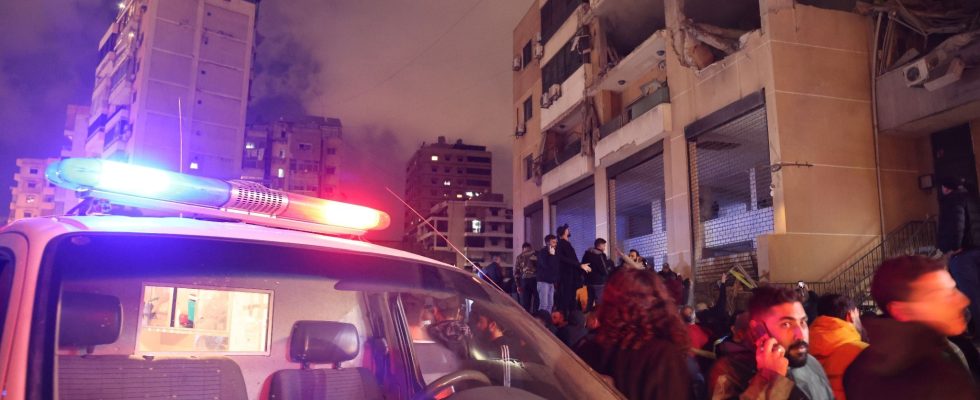After the death of the number 2 of the Hamas political bureau, Saleh al-Arouri, on Tuesday January 2 in an Israeli strike on the suburbs of Beirut, Hezbollah’s reaction was eagerly awaited. This Wednesday, January 3, the leader of the powerful pro-Iranian movement warned the Hebrew state against the outbreak of war in Lebanon, assuring that his formation would fight “without limits”. The Israeli army did not claim responsibility for the strike but said it was preparing for “any scenario”. For Karim Emile Bitar, professor of international relations at Saint-Joseph University in Beirut and specialist in the Middle East, this event, which took place 24 hours before a deadly double attack in Iran, could have serious consequences in the region. , and beyond.
L’Express: Is there currently a fear in Beirut of seeing the conflict between Israel and Hamas expand into Lebanon, through a greater confrontation between the Israeli army and Hezbollah?
Karim Emile Bitar: The feeling of anxiety is quite heavy at the moment. This is certainly not the first time that Lebanese sovereignty has been violated – we regularly witness territorial violations – but the concern of an extension of the conflict was very strong, particularly on Tuesday evening, because this targeted assassination is the first attack Israeli against the Lebanese capital since 2006.
Furthermore, the attack took place in a context of headlong flight on the part of certain members of the Israeli government from the hard right, tempted by a widening of the conflict on the Lebanese scene. The goal is to try to weaken Tehran by striking its Lebanese allies. On this subject, Israel does not seem to have learned the lessons of History: Avigdor Liberman [NDLR : député de la Knesset] has called for reoccupying southern Lebanon for fifty years – forgetting the difficulties Israel had in controlling this territory between the invasion of 1982 and its forced withdrawal in 2000. Beyond demonstrating a ignorance of History, This type of statement gives Hezbollah arguments to present itself to public opinion as a bulwark against threats of Israeli aggression on its soil.
What are the different possible scenarios? Does the risk of regional conflagration really exist?
The risk of escalation does exist. Until now, there was respect for the rules of engagement, despite controlled provocations and slippages on both sides, which never went any further, between Israel and Hezbollah. We could indeed perceive a desire on the part of Iran and the Lebanese Shiite movement not to aggravate the situation. But after Tuesday’s strike near Beirut, it is not excluded that the latter wants to respond – sooner or later – and that in the event that this response is poorly calibrated, hitting targets too important for Israel, the latter will outbid it by devastating manner against Lebanon.
Does Hezbollah have an interest in engaging in a more intense confrontation with the Israeli army? Hassan Nasrallah, the leader of Hezbollah, who was to make important announcements on Wednesday, decided to postpone his declarations. Is this an admission of the movement’s difficulties in knowing what response to provide?
Hezbollah’s somewhat unclear position can have several explanations: first, the need for it to coordinate with its partners within what they call the “axis of resistance” – namely the Palestinian Hamas, the Iranian regime, Iraqi Shiite militias, Syrian regime, etc. There is also, I believe, an awareness that Lebanese public opinion, including among Hezbollah’s political base, is hostile to the opening of a new front. The Lebanese are exhausted after having suffered several traumas in recent years: an unprecedented economic crisis, the explosion of the port of Beirut, a state which is collapsing on a daily basis. Lebanon could very difficultly face a new war with Israel.
And at the same time it is an important affront for the movement: Beirut was struck, Saleh al-Arouri was an important leader of the “axis of resistance” – it was precisely he who had contributed to bringing together Hamas and Hezbollah. They may decide to retaliate, but this could have serious consequences.
What will be the repercussions of the loss of Saleh al-Arouri for Hamas? Is this an important victory for Israel?
He was a significant figure in the organization, but he is not irreplaceable. Saleh al-Arouri was an important figure, who sought, according to certain sources, to mobilize the opposition in the West Bank, where Fatah dominates. But in the fight against movements of this type, you can liquidate ten or fifteen executives, others will succeed them. The real pillars of Hamas are not in Lebanon or Qatar, but on the ground. We cannot eradicate an ideology, a feeling of anger and humiliation.
But the loss of Saleh al-Arouri in any case allows the Israeli army to forget that it was not really able, after 90 days, to achieve the announced objectives: namely the eradication of Hamas. She failed to overcome Yahya Sinwar and Mohammed Deif, the main political and military leaders of the movement.
What could Iran’s reaction be? This event occurred a few hours before the attacks committed during the commemorations of the death of General Soleimani, known for supporting Palestinian factions. Without us yet knowing who is behind this attack, can it be a new destabilizing factor?
Absolutely, the risk of regional destabilization is very real. It must be seen that today, the excessiveness of the Israeli response has united Shiite and Sunni Islamic movements that were until now hostile to each other, as was the case with Hamas and Hezbollah. Remember that General Soleimani was hated in the Sunni world, because of his role in the repression of the Syrian revolution. Today, this divide has been somewhat muted due to the violence of the situation in Gaza, creating a mechanical solidarity between Israel’s enemies, beyond ideological rivalries.
